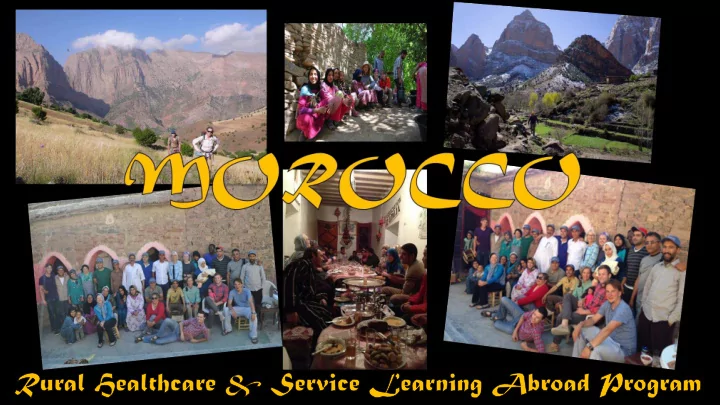

HADM 494 – Rural Healthcare and Culture in Morocco 2019 Spring Semester The MSUB Health Administration program is proud to offer HADM 494 Rural Healthcare and Culture in Morocco -- a global community health engagement field experience. This global service learning experience will take participants to Zawiya Ahansal, Morocco and villages in the Central High Atlas Mountains. Students will compare and contrast rural healthcare in Morocco with the healthcare system in Montana and participate in community-based, healthcare-related service learning projects. Students will learn about the rich culture and traditions of rural Morocco and complete a two-day trek to villages accessible only by foot in the Central High Atlas Mountains.
HADM 494 – May 7-28, 2019 ( 3 weeks ) • Course taught by Leigh Taggart, MPH, BSN • 3 credits (MSUB) • Open to any student as an elective or restrictive elective • This is a great service-learning opportunity to help students get into graduate programs • May substitute this course for Capstone – HADM 499 or Capstone – HADM 697 (second semester) • Cost is estimated at $3,600 ( depending on airfare) • Estimated cost does not include: • Passport fees • Health/travel insurance • Tuition and fees for non-MSUB students
Morocco is a little larger than the state of California Retrieved from: http://bit.ly/2ONta4d
MSUB program at the Zawiya Ahansal Middle School in Amezray. First evening of the trek on the high plateau “ I came here thinking I was going to help others, but I find every day that they are the ones helping me. I cannot explain the impact this has had on me mentally, physically and spiritually .” – Morocco Program Participant, May 2017 Women’s leadership group.
Country Demographics • Population: About 36 million • Median age: 29 • Ethnic groups: Arab, Berber, Europeans, Sub- Sahara African, and Gnawa • Predominate Religion: Muslim (Sunni) • Official Languages: Arabic & Berber • Literacy: 68.5% (Males - 78.6% / Female - 58.8%) SOURCE: http://bit.ly/2Mu72Kj Retrieved from: Retrieved from: http://bit.ly/2M0ljCr http://bit.ly/2nidg SD
Physician Density: 0.62 physicians per 1,000 (2014) SOURCE: https://www.cia.gov/index.html “ Hiking into the “back country” has really shown me how rough so many people have it. There are no services anywhere. Garbage in many villages. So remote…I can’t begin to imagine living as a rural Moroccan. I wouldn’t make it. It was funny traveling through some of the rural areas because people would come out and just stare at us like they were seeing ghosts .” -Morocco Program Participant, May 2017
Zawiya Ahansal • Located deep in the Central High Atlas Mountains, east of Marrakesh • Faculty-led, service- learning course • Population: About 10-15 thousand SOURCE: http://bit.ly/2KA60ej
The Importance of Service-Learning “ We learned about the village’s water supply. There is a lot that goes into having clean water available here. I was surprised that so many young people cared enough to come together and provider their people with a clean water system. It truly was inspiring .” – Morocco Program Participant, May 2017
The Importance of Service-Learning Leigh Taggart, BSN, MPH The Morocco program will give you on-the-ground, practical experience in working with people from a drastically different culture and society. This experience will help to ‘bring the book to life’ and will enrich your path toward becoming a global citizen and healthcare provider.
Health Awareness Days - Women “ Today we did a lot of great things! In the morning, we spoke to a group of local women about breast cancer awareness. It was amazing to see all those women step up to be leaders. I got pretty emotional when the older ladies mentioned that the younger girls are the leaders because they are educated. I feel like I took my education for granted growing up after hearing that .” – Morocco Program Government boarding school at Amezray Participant, May 2017 ACF purchased menstrual hygiene kits for a non-profit organization called Days for Girls. These kits included underwear, three reusable pad liners, six pads, soap, washcloths and a baggie for storage. The village women do not track their menstrual cycles on a calendar; rather, most detect the start of their periods by their symptoms.
Health Awareness Days - Children “ I believe the government school lessons went very smooth and it looked like the kids were enjoying the lessons. I’m very thankful to have Chafiya and Bahamu with me to translate. Both seem very happy and grateful that our group is here in Zawiya to teach health care. Even the kids seemed concerned and scared of diabetes in their families and themselves. ” - Morocco Program Participant, May 2017
Beautiful Scenery “ It is absolutely beautiful out here. I cannot believe that I am camping in the mountains in Africa .” -Morocco Program Participant, May 2017
Incredible Culture
Rustic
Great Food
Great Friends “ I took some time for myself to just sit and breathe in the air and reflect on different parts of this trip. I think I need to make some changes for my own health when I return home. It was an extremely emotional morning (when we left Zawiya Ahansal). We said our good byes and it was all I could do to keep it together. In such a short time we have grown so close. I felt like I’m leaving my family. I pray I will be able to see them all again .” – Morocco Program Participant, May 2017
Recommend
More recommend